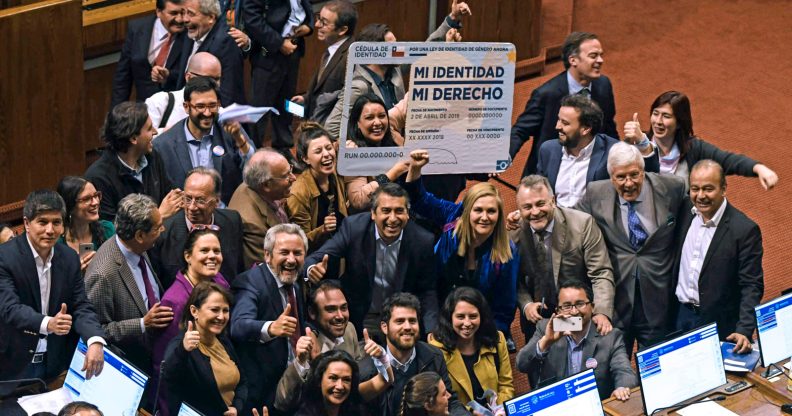Chile approves new gender identity law in ‘great victory for trans people’

Chilean deputies for the Frente Amplio party, celebrate as they hold a giant fake Chilean Identity card reading “My identity, my right”, after voting a gender identity law, during a session at the Deputies Charmber, of the National Congress in Valparaiso, Chile, on September 12, 2018. – Chilean deputies approved a gender identity law that allows the change of name and sex in public records from the age of 14, the last step of a five-year-long legislative debate that confronted conservatives with the LGBTI community. (Photo by FRANCESCO DEGASPERI / AFP) (Photo credit should read FRANCESCO DEGASPERI/AFP/Getty Images)
Chile has passed a new gender identity law that will allow transgender people aged 14 years and above to change their name and gender in official documents.
The process will take place at a civil registry and will not require surgical or medical intervention, although minors will have to obtain permission from a parent or guardian and from a family court.
The law was first approved by a large majority of 26 in favour and 14 against in the Senate last week and landed in the country’s Congress on Wednesday (September 11), where it passed a 95-46 vote marking the end of a five-year-long fight by transgender rights activists.
Chilean president Sebastián Piñera now has 30 days to sign the law.
“We celebrate! The Chamber of Deputies voted and dispatched the gender identity law, which we sponsored more than five years ago. A great victory for TRANS people!” the Chilean non-governmental organisation Fundación Iguales, which champions LGBT+ rights, tweeted following the vote.
One of the law’s most controversial elements was the inclusion of minors, with LGBT+ activists lamenting the age limit of 14 in the bill. The legislation originally included children younger than 14 years of age, but a vote on this provision failed to reach the necessary majority.
“Today is bittersweet since the discrimination against those under 14 will translate into more suicides,” Rolando Jimenez, one of the founders of the Movement for Homosexual Integration and Liberation, was quoted as saying in the Associated Press (AP).
Two conservative lawmakers who voted against the law have instead vowed to challenge the inclusion of any person below 18 years of age in the bill.
Sergio Bobadilla and Juan Antonio Coloma claimed the project “undermines the right of the biological identity of minors” and have said they will present that argument in front of the country’s Constitutional Court, AP reported.

Daniela Vega, delivers a press conference after a meeting with Chilean President Michelle Bachelet on March 6, 2018. (Pablo Vera/AFP/Getty)
Chilean transgender actor and singer Daniela Vega, the star of the 2018 Oscar-winning film A Fantastic Woman, celebrated news of the vote writing a poetic post on Instagram on Thursday, in which she remembered those who have died without seeing the law becoming reality, as well as celebrating a more hopeful future.
She wrote: “The testimony and the body as a declaration of rebellion. But you cannot be rebellious without first being worthy and dignity is not a faith, it is a right. Do not fear children, there will be arms that contain your beautiful nature.
“To wall in the door is not going to darken the horizon, because it will be you, children who will govern your biography. The art, infinite key of immovable locks. The will, motor of the future that appears more hopeful today.
“There are those who did not see this day, this dawn, their bodies, dignified by the memory of rebellion, of dignity. Love, motor of experience. Love, endorsement of infinite space.
“To live, to resist, to move in the calendar. The time and objectivity of feeling it happen. To have today, the right to live in, to belong. Future body, white canvas of new struggles, new utopias, new spaces, of movement, of dignity.”

